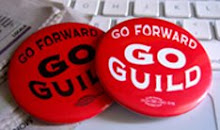"Whether by supervision of the courts or by negotiation to convert some debt to equity, America's banks will own a large position in the newspaper sector going forward. Get used to it."
In a surprisingly candid moment, Singleton also suggested that the eventual denouement of corporate newspaper empires might be the best thing that could happen to the industry.
"Is this all bad? Probably not," Singleton said, predicting the result could be that newspapers are eventually owned once again by people wanting to cover news and shape opinion through editorial pages instead of being publicly owned corporations forced to meet Wall Street's profit expectations.
![DailyNews[room]](http://4.bp.blogspot.com/_K-X2U5TCOfM/SX_pvIbycAI/AAAAAAAAAO0/sDmKq2S-PJE/S1600-R/final+DN+header.gif)





